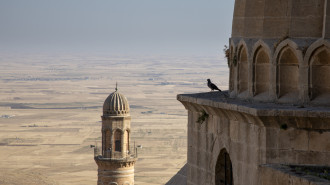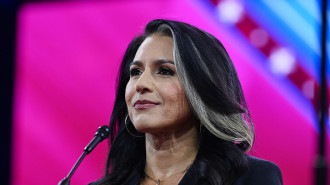Iraq, Turkey agree to cooperate on extremist groups
Turkey and Iraq have agreed to continue their cooperation in fighting extremist organizations, including the Islamic State group and Kurdish rebels, Turkish President Recep Tayyip Erdogan said Thursday.
Speaking to reporters following meetings with visiting Iraqi Prime Minister Mustafa al-Kadhimi, Erdogan also said he hoped that an Iraqi-Turkish oil pipeline that was damaged by the IS during the conflict against the militant group would soon be repaired and would resume oil transfers to world markets.
Turkey has carried out numerous ground and aerial cross-border offensives into neighboring northern Iraq to attack militants of the Kurdistan Workers' Party, or PKK, who maintain bases in the region.
The latest offensive in June, dubbed Operation Claw Tiger, saw Turkish commandos being airlifted into Iraqi territory.
The PKK, which has been fighting the Turkish state since 1984, is considered to be a terror organization by Turkey, the United States and the European Union.
Twitter Post
|
"We have agreed to continue our struggle against our common enemies IS, PKK and FETO," Erdogan said — the latter a reference to a network led by US-based Turkish cleric Fethullah Gulen, who Turkey blames for a failed coup in 2016. Gulen denies involvement in the attempt.
"There is no place for separatist terrorism in Turkey, Iraq or Syria," Erdogan said. "Our region will not find peace until terrorism is quashed." he added.
Speaking through an interpreter, al-Kadhimi told reporters that it was "not possible for Iraq to show tolerance toward any (group) that threatens Turkey."
The two countries also agreed to continue working on a Turkish-proposed action plan geared toward the "effective use" of the waters of the Tigris River, following Turkey's construction of Ilisu Dam in southeast Turkey, the Turkish leader told journalists.
"As Turkey, we stress that water shouldn't be assessed as a factor for disagreement, but a field for cooperation," Erdogan said.
Read more: Iraq to face severe shortages as river flows drop, minister says







 Follow the Middle East's top stories in English at The New Arab on Google News
Follow the Middle East's top stories in English at The New Arab on Google News
![Israel demolished homes in the Silwan area [Getty]](/sites/default/files/styles/image_330x185/public/2024-11/GettyImages-2183868368.jpg?h=199d8c1f&itok=TweR8vd0)

